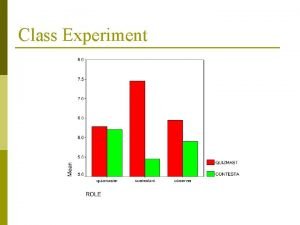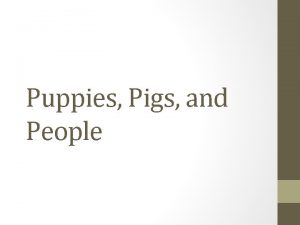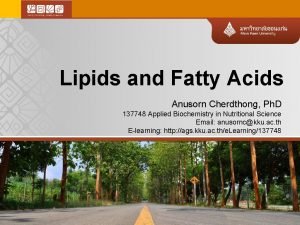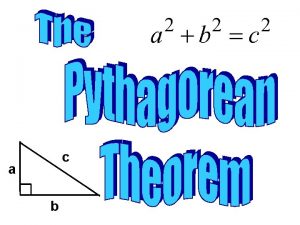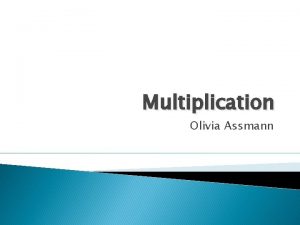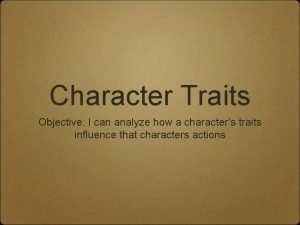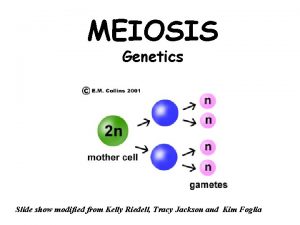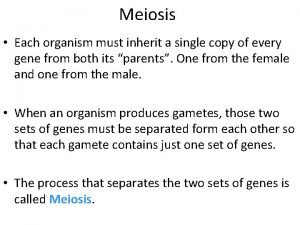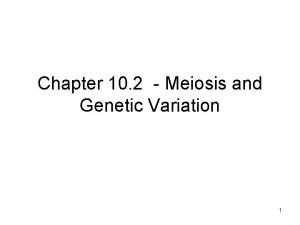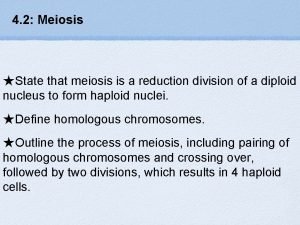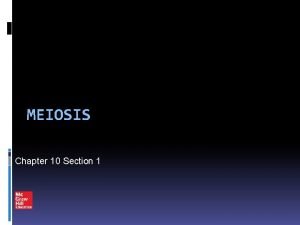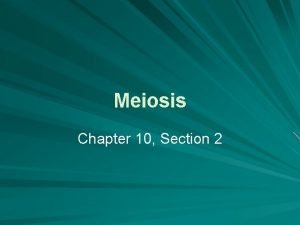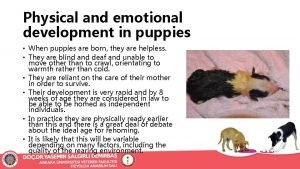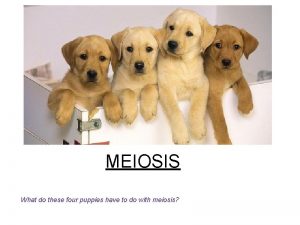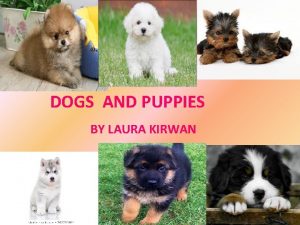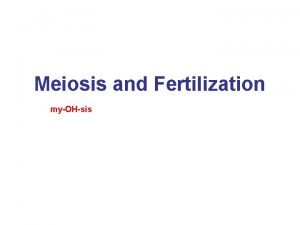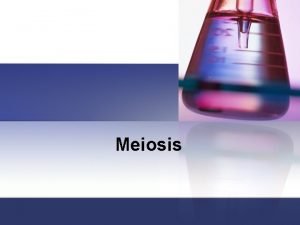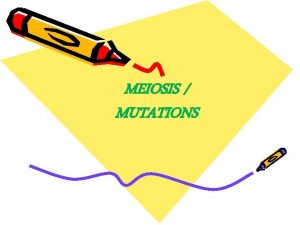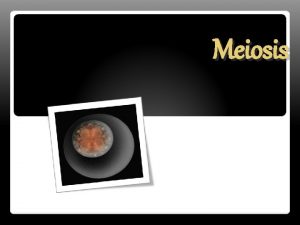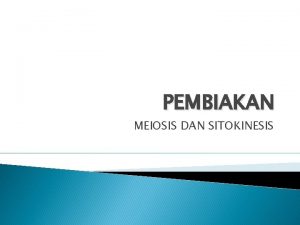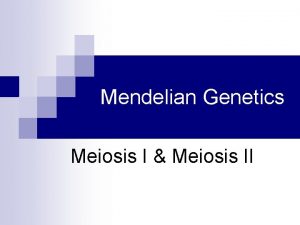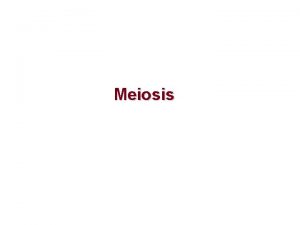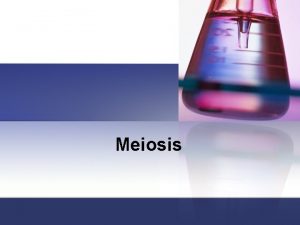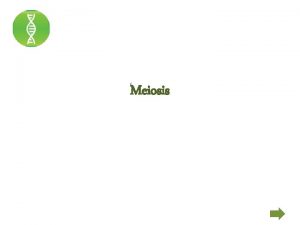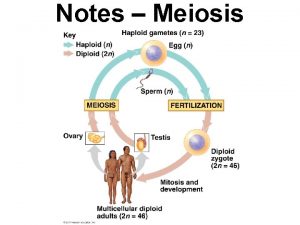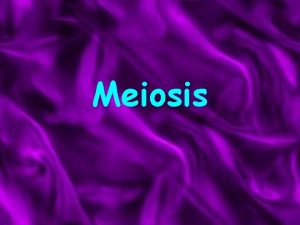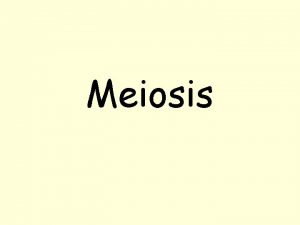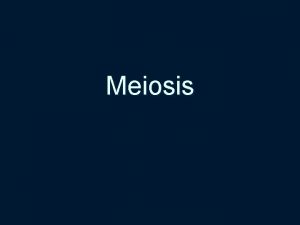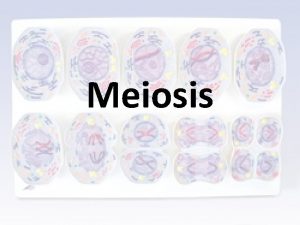Meiosis Meiosis Essential Question Why are the puppies





























- Slides: 29

Meiosis

Meiosis Essential Question • Why are the puppies in a litter similar to but not exact copies of each other or their parents?

Reproduction • Reproduction in organisms creates offspringnew organisms!

• Asexual reproduction: one parent organism produces one or more new organisms that are identical to itself.

• Mitosis results in the creation of two daughter cells that are identical to the parent cell.

• Unicellular organisms use mitosis to reproduce. • The cells in multicellular organisms also use mitosis to reproduce (like your skin cells when you get a cut).

• Sexual Reproduction: male and female reproductive cells combine to form offspring with genetic material from BOTH parents.

• The male parent contributes a sperm cell and the female parent contributes an egg cell, each of which contain HALF of their genetic material.

• When a sperm and egg cell fuse together, they form a cell called a zygote, which develops into the new organism.

• A zygote grows and develops into an organism by using mitosis to divide its cells.

Meiosis • The process in which reproductive cells divide to form sperm cells and egg cells is called meiosis.

• Meiosis ensures that the offspring will inherit the correct number of chromosomes.

• Without meiosis, the number of chromosomes would double with each generation.

Meiosis consists of 2 cycles of division, meiosis I and meiosis II. Before meiosis begins, the DNA is replicated so the cell has two copies of its DNA.

• Meiosis I is a lot like mitosis- two daughter cells are made, each with a full set of DNA. • UNLIKE mitosis, daughter cells in meiosis I are NOT identical.

• Meiosis I daughter cells are not the same because of a process called recombination (genetic reshuffling).

• In Meiosis II, the process repeats, but this time the DNA is NOT replicated before the cells divide.

• The end result of meiosis II is four gametes, each of which have HALF the amount of chromosomes as the parent cells.

Meiosis

Advantages of Sexual Reproduction • Leads to genetic variation • Variety of traits in a population of the same species • Can help a species survive environmental changes


Advantages of Sexual Reproduction • Selective Breeding • Offspring with certain desired traits can be made by breeding parents with the preferred traits • Results in groups of organisms with similar traits

Disadvantages of Sexual Reproduction • Getting a sperm cell and egg cell together to be fertilized can be challenging for some species

Disadvantages of Sexual Reproduction • Organisms need time to grow and develop before they are able to reproduce.

What is the cell called that forms from fertilization? A. Sperm B. Egg C. Haploid D. Zygote

How many daughter cells are produced at the end of meiosis? A. One B. Two C. Three D. Four

What is one advantage of sexual reproduction? A. It produces many offspring B. Offspring are genetically identical C. Offspring have more genetic variation D. Can produce offspring quickly

During sexual reproduction, the offspring inherit traits from A. The mother B. The father C. Both parents D. Themselves

Asexual organisms differ from sexual organisms in that asexual organisms A. Have no genetic code B. Do not undergo reproduction C. Produce a new organism from a single parent D. Reproduce using cells from two parents
 Antigentest åre
Antigentest åre Andreas carlsson bye bye bye
Andreas carlsson bye bye bye Question question question
Question question question Similarities and contrast
Similarities and contrast Malcolm gladwell hush puppies
Malcolm gladwell hush puppies Topic nouns
Topic nouns Puppies pigs and people
Puppies pigs and people Coccidia in dogs symptoms
Coccidia in dogs symptoms Characteristics of lipids
Characteristics of lipids Don't ask why why why
Don't ask why why why Essential questions for figurative language
Essential questions for figurative language Essential question for pythagorean theorem
Essential question for pythagorean theorem Essential question generator
Essential question generator Essential questions for pythagorean theorem
Essential questions for pythagorean theorem Figurative language essential questions
Figurative language essential questions Individual vs society
Individual vs society Essential question for context clues
Essential question for context clues Cornell notes essential question
Cornell notes essential question Open-ended questions examples
Open-ended questions examples Essential question for multiplication
Essential question for multiplication Essential question gif
Essential question gif Essential question for character traits
Essential question for character traits The cornell way
The cornell way Essential question for poetry
Essential question for poetry Anaphase meiosis vs mitosis
Anaphase meiosis vs mitosis Meiosis 1
Meiosis 1 Crossing over occurs during
Crossing over occurs during Difference between meiosis 1 and 2
Difference between meiosis 1 and 2 Chapter 10 section 1 meiosis answer key
Chapter 10 section 1 meiosis answer key Chapter 10 section 1: meiosis
Chapter 10 section 1: meiosis




